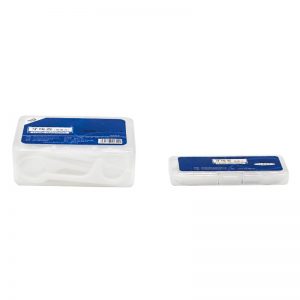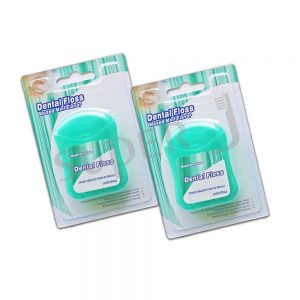Dental floss is made from a variety of materials, each with its own unique properties and benefits. Here are some of the common materials used in dental floss:
- Nylon (Multifilament) Floss:
- Nylon is one of the most common materials used for dental floss.
- It’s composed of multiple strands of nylon fibers twisted together.
- Nylon floss can come in both waxed and unwaxed versions.
- Waxed nylon floss has a wax coating that makes it easier to slide between teeth.
- PTFE (Monofilament) Floss:
- PTFE stands for polytetrafluoroethylene, a synthetic material.
- PTFE floss is made from a single strand of this material.
- It’s often smoother and less likely to shred compared to nylon floss.
- PTFE floss glides easily between teeth and is suitable for tight spaces.
- Silk Floss:
- Silk was one of the original materials used for dental floss.
- Silk floss is made from natural silk fibers and is known for its strength and softness.
- It’s less common today due to the popularity of synthetic materials and concerns about hygiene.
- Cotton Floss:
- Cotton floss is made from natural cotton fibers.
- It’s softer and may be more comfortable for individuals with sensitive gums.
- However, it can be prone to fraying or breaking more easily than synthetic floss.
- Polyester Floss:
- Polyester floss is another synthetic option.
- It’s durable and generally resistant to shredding or breaking.
- Polyester floss can come in various thicknesses and textures.
- Biodegradable Floss:
- Biodegradable floss is often made from natural materials like silk, bamboo, or plant-based fibers.
- It’s designed to break down more easily in the environment compared to traditional synthetic floss.
- Expanded PTFE Floss:
- Similar to regular PTFE floss, but designed to expand upon contact with moisture.
- This expansion can help the floss cover a larger cleaning area.
- Flavored Floss:
- The flavoring used in some floss products is typically added to the outer coating and doesn’t significantly affect the material itself.
The choice of floss material often depends on personal preference, dental needs, and any specific concerns you might have, such as sensitivity or environmental considerations. It’s worth nog thtinat dental professionals generally recommend any type of floss that you’re comfortable using regularly, as consistency is key to maintaining good oral hygiene. If you’re unsure about which type of floss is best for you, consider discussing it with your dentist or dental hygienist.








